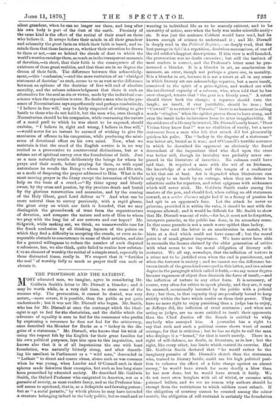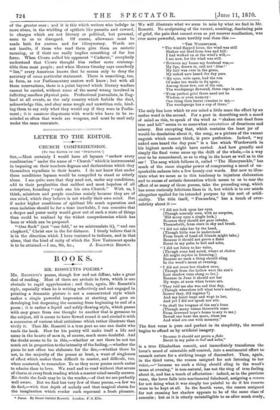THE PROFESSOR AND THE SATIRIST.
Tv IOST educated men, we imagine, agree in considering Mr.
Goldwin Smith's letter to Mr. Disraeli a blunder ; and it may be worth while, in a very dull time, to state some of the -reasons why. The provocation, it cannot be denied, was very severe,—more severe, it is possible, than the public as yet quite understands ; but it was not Mr. Disraeli who began. Mr. Smith, who has for Mr. Disraeli at once the contempt which the ideol- ogist is apt to feel for.the rhetorician, and the dislike which the Advocate of equality is sure to feel for the commoner who profits by expressing a reverence he does not feel for the aristocracy, -once described the Member for Bucks as a " lackey in the dis- guise of a statesman." Mr. Disraeli, who knows that his trick of using the respect felt by the English for their great families for his own political purposes, lays him open to this imputation, and knows also that it is of all imputations the one with least foundation, was naturally bitterly stung, and after describ- ing his assailant in Parliament as a " wild man," descended in " Lothair " to direct and coarse abuse, abuse such as was common when he was young, when Landor and O'Connell each in their -spheres made fishwives their examples, but such as has long since been proscribed by educated society. He described Mr. Goldwin .Smith, the Oxford Professor who emigrated to America, not as a parasite of society, as most readers fancy, and as the Professor him- self seems to aprehend, that is, as a lickspittle and fawning person ; but as " a social parasite," by which phrase be may have intended a creature belonging indeed to the body politic, but so small and so
wanting in individual life as to be scarcely existent, and to be unworthy of notice, save when the body was under scientific analy- sis. It was just the sentence Cobbett would have used, had he known enough of science to understand it ; and Mr. Disraeli is deeply read in the Political Register,—so deeply read, that the best passage in Sybil is a repetition, doubtless unconscious, of one of the old soldier's happiest descriptions. If this view is well founded, the provocation was no doubt excessive ; but still the instinct of moat readers is correct, and the Professor's letter must be pro- nounced a blunder. It is a blunder in art, an anachronism in manners, an error, though not perhaps a grave one, in morality. It is a blunder in art, because it is not a retort at all in any sense in which literary art can acknowledge repartee, but a mere insult, conceived in the spirit, of a prize-fighter, and worked out with the intellectual capacity of a cabinau, who, when told that he has over-charged, retorts that " the gent is a bloody cove." A retort should throw back the charge ; a repartee should turn the laugh ; an insult, if ever justifiable, should be true ; but "Coward!" is no retort to "Parasite!" there is no humour in calling words "stingless" when the epithet proves them to have stung, and even the insult lacks incisiveness from its utter inapplicability. If the evidence of a life maybe trusted, Mr. Disraeli's early boast, "Does Vivian Grey know fear?" was no ebullition of vanity, but a mere statement from a man who felt that attack did but pleasurably quicken his pulse. The " lackey in the disguise of a statesman " was better art, brutal as it was ; and O'Connell's terrible sentence in which lie described his opponent as obviously the lineal descendant of the impenitent thief who died upon the cross was better still, though its brutality was probably never sur- passed in the literature of invective. No cabman could have said that. It required a man with the wit of an Irishman, the knowledge of a scholar, and the tongue of a coalheaver to hit that out at heat. Art is degraded when littdrateurs can only reply to an insult by an outrage, when they are driven to substitute oaths for repartees, and rebut epigrams with nicknames which will never stick. Mr. Goldwiu Smith ranks among the masters of the pen, and should feel, when calling an old statesman coward, as a maitre d'armcs might feel if in a frenzy of passion he had spit in an opponent's face. Let the attack be never so grievous, provided it is within the rules, it should be met with the weapons allowed ; and it would be difficult for Mr. Smith to show that Mr. Disraeli was out of rule,—for he, it must not be forgotten, interprets parasite, as the public has done, in its secondary sense. In that sense parasite is not a much worse epithet than lackey.
We have said the letter is an anachronism in morals, for it hints at a duel which could not have come off ; but the moral point is of much greater importance. We have never been able to reconcile the licence claimed by the older generation of critics with what seems to us the moral obligation of literary self- restraint. We all say, nowadays, that the infliction of torture is a crime not to be justified even when the end is punishment, and when the torturer is society ; and we cannot see the difference be- tween insult of the gross kind conveyed in this letter, and in a minor degree in the paragraph which called it forth,—we say minor degree because vagueness of object does diminish the force of insult,—and the infliction of torture in any other form. It is necessary, of course, very often for critics to speak plainly, and they are, it may be assumed, occasionally invested by the public with a judicial duty ; but then, in that capacity they are peculiarly bound to keep strictly within the laws which confer on them their. power. They have no more right to enjoy punishing than a judge has to enjoy, as Jeffreys did, the infliction of cruel sentences ; and when not acting as judges, are no more entitled to insult their opponents than the Chief Justice off the Bench is entitled to whip anybody who annoyed him. A journalist has a right to say that such and such a political course shows want of moral courage, for that is criticism ; but he has no right to call the man who displays it a "hound," for that is insult merely. There is a right of self-defence, no doubt, in literature, as in law ; but the right, like every other, has limits which control its exercise. Had Mr. Goldwin Smith declared that " he would rather be the imaginary parasite of Mr. Disraeli's sketch than the statesman who, trained to literary battle, could use his high political posi- tion to enhance the effect of a false charge against an absent enemy," he would have struck far more deadly a blow than he has now done, but he would have struck it fairly. We do not meet even burglars with oil of vitriol, or enemies with poisoned bullets, and we see no reason why authors should be exempt from the restrictions to which soldiers must submit. If the obligation of courtesy cannot be counted among the minor morals, the obligation of self-restraint is certainly the foundation of the greater ones ; and it is this which writers who indulge in mere abuse, in the wielding of epithets like parasite and coward, in charges which are not literary or political, but personal, seem to us to disregard. Of course, allowance must be made both for custom and for idiosyncrasy. Words are not insults, if those who read them give them an esoteric meaning, or if their use really implies something of far less force. When Cicero called his opponent " Cadaver," everybody understood that Cicero thought him rather more contemp- tible than most people; and when Horace Greeley says somebody "lies," every American knows that he means only to deny the accuracy of some particular statement. There is something, too, in form, as our Parliamentary orators well know; but with all those reservations, there is a point beyond which literary warfare cannot be carried, without some of the moral wrong involved in inflicting needless physical pain. Professional journalists, in Eng- land at all events, as the only country which forbids the duel, acknowledge this, and obey some rough and unwritten rule, bind- ing them to say only what they would say if they were in Parlia- ment; it is amateur disputants with words who have to be re- minded so often that words are weapons, and must be used only under the same restraints.































 Previous page
Previous page